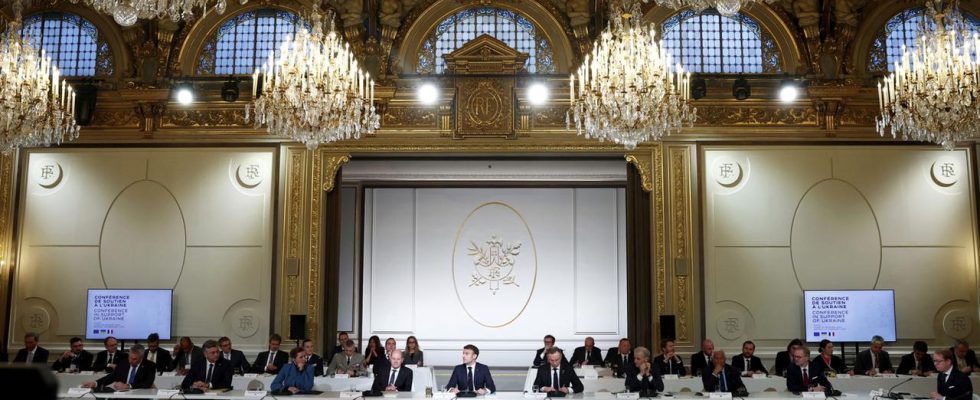NATO, other EU states and our own opposition: Macron’s thought process about ground troops in Ukraine invariably receives criticism. What does France’s president want to achieve with his initiative?
The meeting in Paris was intended to be a demonstration of unity – it will be remembered as a milestone of disunity. And that’s because Emmanuel Macron has rushed ahead, once again. When asked by a journalist whether it was true what the Russia-friendly Slovakian Prime Minister Robert Fico reported – namely that the Paris meeting had discussed sending ground troops – Macron answered in the affirmative.
Everything was discussed very openly and directly. There is no consensus about sending ground troops to Ukraine. “But we have a dynamic in which nothing can be ruled out. We are doing everything so that Russia cannot win this war,” said the French president.
Other countries are declining
When Macron said this, many of his colleagues had already left. But the reactions didn’t take long to arrive in the morning. Poland, Italy, Great Britain and Slovakia immediately announced that they did not plan to send ground troops to Ukraine.
Sweden stated that ground troops are not currently an issue and Federal Chancellor Olaf Scholz assured on the sidelines of an event in Freiburg: “In the future, too, there will be no ground troops, no soldiers on Ukrainian soil sent there by European states or NATO states become.”
“Strategic ambiguity” towards Russia
Now it’s a mystery why Macron leaned so far out of the window without necessity. What is certain is that the push for ground troops fits with his philosophy of deterrence and “strategic ambiguity” towards Russia. Moscow should not feel safe. There is no tiredness of support in the EU, it was said from the Elysée Palace in the run-up to the conference.
At the same time, Macron defines himself as a leader in the EU, as the one who brought the goal of European sovereignty to the attention of heads of state and government, who is driving Europe to become more independent. He said: “It’s our future. Europe is at stake! So the Europeans have to decide too. We have to get along without outside help. Not out of suspicion or pessimism, but simply because it depends on us.”
Top against Germany?
But his move can also be understood as a tip against Germany. Because Germany and France accuse each other of not doing enough to support Ukraine. Berlin criticizes that France’s aid to Ukraine is far too little. Paris, in turn, points out that, in contrast to Germany, they are supplying long-range missiles that are urgently needed on the battlefield.
It seemed to be barely concealed criticism of Chancellor Scholz when Macron declared on Monday evening that many of those who said “never, never” today were the same as those who had said in the past: “Never tanks, never planes.”
Criticism from the opposition – and from the Kremlin
In France itself, Macron’s statement that he would not rule out sending ground troops to Ukraine was met with largely unanimous rejection. The radical left-wing spokesman Jean-Luc Mélenchon from the La France Insoumise party wrote on X that this would make France a participant in the war. “This verbal escalation by a nuclear power against another major nuclear power is irresponsible.”
The parliamentary group leader of the extreme right Rassemblement National, Marine Le Pen, also rejected Macron’s proposal. The president plays “war chief.” And Oliver Faure, the head of the Socialists, criticized the president for letting it be known with “worrying ease” that France could become a party to the war. Drawing the continent into a war against Russia would be “madness,” said Faure. Macron’s Prime Minister Gabriel Attal, in turn, defended the president’s stance. In parliament he warned: “Nobody knows where Moscow will stop.”
Moscow itself reacted harshly. A Kremlin spokesman said that the very fact that the possibility of sending some contingents from NATO countries to Ukraine was being discussed was a “very important new element.” This would inevitably result in a confrontation.
resolutions Ammunition procurement
The core agreements of the Paris Conference were almost lost over the dispute over ground troops. 15 state representatives spoke out in favor of the Czech proposal to purchase ammunition for Ukraine from non-European countries. The Netherlands wants to provide 100 million euros for this.
In this context, the French President also welcomed the proposal made by the Estonian Prime Minister a few weeks ago. Namely, to set up an EU debt fund to make such purchases possible. Ammunition is currently the top priority, Macron reiterated: “We want to do everything we can to buy ammunition abroad.”
Coalition of the Willing for Long-range missiles
The question of long-range missiles is and remains a sensitive topic. Chancellor Scholz, who left quickly after the end of the conference, refuses to deliver Taurus cruise missiles. France, on the other hand, is delivering its long-range SCALP missile. A coalition of willing states should now be formed to organize the delivery of medium and long-range missiles.
From the perspective of Ukraine’s President Volodymyr Zelenskyj, this is certainly a welcome step. At the beginning of the conference, he addressed his allies via video message: “Together we have already saved millions of lives, and together we must now ensure that Putin does not destroy what he has achieved and that he cannot expand his aggression to other states. “
Five goals
Like Moldova, for example. The conference participants agreed on five goals that they wanted to pursue together: protecting Moldova, intensifying cyber defense against Russia, strengthening Ukraine on the Belarusian border, producing weapons and ammunition and helping with mine clearance.
Julia Borutta, ARD Paris, tagesschau, February 27, 2024 4:43 p.m

